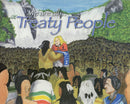Description
We Are All Treaty People is the 34-page illustrated history produced by the Union of Ontario Indians to promote their understanding of treaties for all people in Ontario. Written by Maurice Switzer, with coloured drawings by Charley Hebert, the book offers students and educators a brief look at the history of treaties from the Anishinabek perspective. The Anishinabek Nation includes Algonquin, Delaware (Lenape), Mississauga, Ojibwe, Odawa, and Potawatomi. The book begins with a brief overview of Anishinabek cultural history and worldview. A prediction about the newcomers comes to pass as the people assist these newcomers with food, medicines, and survival techniques. The story continues as the period of peaceful co-existence comes to an end when competition between the French and English is decided during the Seven Year's War. As the chronological history is explained, readers are introduced to Pontiac, the Royal Proclamation, the Treaty of Niagara, and the significance of treaty wampum belts such as the “Covenant Chain” and the Twenty-four Nations Belts. Haudenosaunee (Six Nations Iroquois) history documents the exchange of the Covenant Chain Belt with the Dutch, British, and the Americans. Tecumseh, the American Revolution, Indian Territory, the Treaty of Grenville, the War of 1812, and the Robinson Huron and Robinson Superior Treaties are topics covered in We Are All Treaty People. Interspersed throughout these sections are maps, reproductions of treaties, and illustrations of wampum belts. The text moves on to the creation of reserves, land rights issues, the spirit and intent of treaties, the development of legislation called the Indian Act, the creation of residential schools, the 1969 White Paper, the growth of First Nations leadership, and the creation of the Assembly of First Nations. The final pages discuss the three crucial events in the 1990s: Oka, Gustafsen Lake, and Ipperwash. The result of these and other crucial events was the Royal Commission on Aboriginal Peoples (RCAP) and the Ipperwash Inquiry. RCAP recommendations reference the importance of the treaty relationship between First Nations and all Canadian citizens. This book's concise retelling of Anishinabek history makes it an excellent resource for schools and libraries. Ontario teachers and librarians will find this title is an excellent historical inquiry resource for providing Anishinabek perspective in the new elementary Social Studies curriculum. Highly recommended. Intermediate Spring 2012. FNCR 2013
French version: https://goodminds.com/products/9780986821127
Ojibwe version: https://goodminds.com/products/9780986506567


